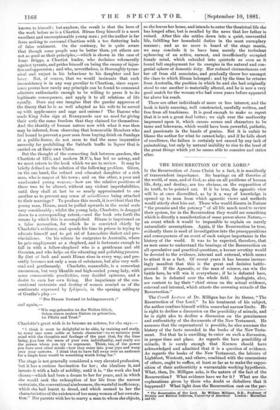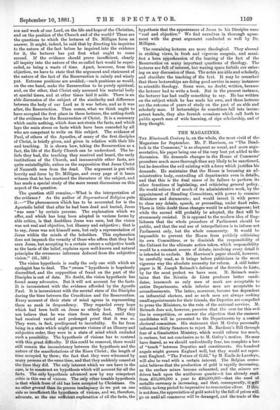THE RESURRECTION OF OUR LORD.* IF the Resurrection of Jesus
Christ be a fact, it is manifestly of transcendent importance. Its bearings on all theories of the world, of man, and of God, as also on all problems of human life, duty, and destiny, are too obvious, on the supposition of its truth, to be pointed out. If it be true, the agnostic view will be at once discredited, as by it a way of knowledge is opened up to man from which agnostic views' and methods would utterly shut him out. Those who would discern in Nature " the promise and the potency " of all life much need to review their system, for in the Resurrection they would see something which is directly a manifestation of some power above Nature,— an event which it would be impossible to explain on merely naturalistic assumptions. Again, if the Resurrection be true, evidently there is need of investigation into the presuppositions and consequences of an event of such unique importance in the history of the world. It was to be expected, therefore, that as men came to understand the bearings of the Resurrection on all speculative and practical questions, a keener scrutiny would be devoted to the evidence, internal and external, which seems to attest it as a fact. Of recent years it has become increas- ingly manifest that this is the great and decisive battle- ground. If the Agnostic, or the man of science, can win the battle here, he will win it everywhere ; if he is defeated here, then he is defeated over the whole field. Apologists, also, are content to lay their " chief stress on the actual evidence, external and internal, which attests the crowning miracle of the Resurrection."
The Crean Lecture of Dr. Milligan has for its theme, "The Resurrection of Our Lord." In his treatment of his subject, the author confines himself within somewhat narrow limits. He is right to decline a discussion on the possibility of miracle, and he is right also to decline a discussion on the genuineness and authenticity of the documents of the New Testament. He assumes that the supernatural is possible, he also assumes the history of the facts recorded in the books of the New Testa- ment. Not that he is unwilling to enter on such a discussion, in proper time and place. As regards the bare possibility of miracle, it is surely enough that Kuenen should have acknowledged and admitted that it is a question of evidence. As regards the books of the New Testament, the labours of Lightfoot, Westcott, and others, combined with the concessions of others, ought to suffice, at least so far as to make the suppo- sition of their authenticity a warrantable working hypothesis. What, then, Dr. Milligan asks, is the nature of the fact of the Resurrection? What evidence have we for it? What are the explanations given by thoie who doubt or disbelieve that it happened? What light does the Resurrection cast on the per-
* The Resurrection of Our Lord. By William Milligan, D.D., Professor of Divinity and Biblical Criticism, University of Aberdeen. London : Macmillan and Co.
son and work of our Lord, on the life and hope of the Christian, and on the position of the Church and of the world ? These are the questions to which the lectures of Dr. Milligan form an answer. It might, indeed, be said that by directing his inquiries to the nature of the fact before he inquired into the evidence for it, the lecturer has put first what ought to come second. If the evidence should prove insufficient, clearly all inquiry into the nature of the so-called fact would be super- seded, as being a waste of time. Apart, however, from this objection, we have to state that the argument and statement of the nature of the fact of the Resurrection is calmly and wisely put. Extreme positions are avoided,—such positions as would, on the one hand, make the Resurrection to be purely spiritual, and, on the other, that Christ only assumed his material body at special times, and at other times laid it aside. There is an able discussion of the subject of the similarity and difference between the body of our Lord as it was before, and as it was after, the Resurrection. Then comes, what we think ought to have occupied the first place in these lectures, the setting-forth of the evidence for the Resurrection of Christ. It is a summary which omits nothing, which does not strain the facts, and which lays the main stress on facts which have been conceded by all who are competent to write on this subject. The evidence of Paul, of others of the Apostles, of many of the first disciples of Christ, is briefly given, and given in relation with their life and teaching. It is shown how, taking the Resurrection as a fact, the life of the Early Church can be understood. The be- liefs they had, the teaching they received and heard, the early institutions of the Church, and innumerable other facts, are quite unintelligible, unless on the supposition that Jesus Christ of Nazareth rose from the dead. The argument is put with brevity and force by Dr. Milligan, and every page of it bears witness that he has mastered the literature of the subject, and has made a special study of the more recent discussions on this aspect of the question.
The question still remains,—What is the interpretation of the evidence ? As the author Of Supernatural Religion puts it :—" The phenomenon which has to be accounted for is the Apostolic belief that after he had been dead and buried, Jesus `was seen' by certain persons. The explanation which we offer, and which has long been adopted in various forms by able critics, is that doubtless Jesus was seen, but the vision was not real and objective, but illusory and subjective ; that is to say, Jesus was not himself seen, but only a representation of Jesus within the minds of the beholders. This explanation does not impeach the veracity of those who affirm that they had seen Jesus, but accepting to a certain extent a subjective truth as the basis of the belief, explains upon well-known and natural principles the erroneous inference deduced from the subjective vision." (iii., 526.)
The vision hypothesis is really the only one with which an apologist has to deal. The " swoon " hypothesis is hopelessly discredited, and the supposition of fraud on the part of the Disciples is out of date. No doubt, the vision hypothesis has found many advocates. But it will not account for the facts. It is inconsistent with the evidence afforded by the Apostle Paul. It is inconsistent with the mental state of the Disciples during the.time between the Crucifixion and the Resurrection. Every account of their state of mind agrees in representing them as sunk in despondency. They regarded every hope which had been built on Jesus as utterly lost. They did not believe that he was risen from the dead, until they had received varied and prolonged proof that it was so. They were, in fact, predisposed to incredulity. So far from being in a state which might generate visions of an illusory and subjective order, they were in a state of mind which excluded such a possibility. The hypothesis of visions has to contend With this great difficulty. If this could be removed, there would still remain the inconsistency between the hypothesis and the nature of the manifestations of the Risen Christ; the length of time occupied by them; the fact that they were witnessed by many persons at the same time, and that they suddenly ceased at the time they did. The only interest which we can have in the case, is to construct an hypothesis which will account for all the facts. The only hypothesis advanced now by any competent critic is this one of visions. The only other tenable hypothesis is that which from of old has been accepted by Christians. On no other ground than its proven inadequacy do we put on one side as insufficient the hypothesis of visions, and we, therefore, advocate, as the one sufficient explanation of all the facts, the
hypothesis that the appearances of Jesus to his Disciples were• " real and objective." We find ourselves in thorough agree- ment with the great argument conducted so well by Dr. Milligan.
The remaining lectures are more theological. They abound in striking views, in fresh and vigorous exegesis, and mani- fest a keen apprehension of the bearing of the fact of the- Resurrection on many important questions of theology. The lectures are full of interest, but waning space forbids our enter- ing on any discussion of them. The notes are able and scholarly, and elucidate the teaching of the text. It may be remarked that these lectureships are doing good service in many instances- to scientific theology. Some were, no doubt, written, because• the lecturer had to write a book. But in the present instance, the lecturer has had really something to say. He has written on the subject which he has made his own, and these lectures- are the outcome of years of study on the part of an able and scholarly man. If lectureships do sometimes fall into incom- petent hands, they also furnish occasions which call forth to- public speech men of wide learning, of ripe scholarship, and of deep thought.































 Previous page
Previous page